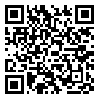دوره 5، شماره 3 - ( 5-1397 )
جلد 5 شماره 3 صفحات 15-10 |
برگشت به فهرست نسخه ها
Download citation:
BibTeX | RIS | EndNote | Medlars | ProCite | Reference Manager | RefWorks
Send citation to:



BibTeX | RIS | EndNote | Medlars | ProCite | Reference Manager | RefWorks
Send citation to:
Abdi R, poorjabbar akhuni F. Mediating Role of Self-Control in the Effectiveness of Religious Beliefs on Addiction Tendency (Case Study: Tabriz University of Medical Sciences). Health Spiritual Med Ethics 2018; 5 (3) :10-15
URL: http://jhsme.muq.ac.ir/article-1-222-fa.html
URL: http://jhsme.muq.ac.ir/article-1-222-fa.html
Mediating Role of Self-Control in the Effectiveness of Religious Beliefs on Addiction Tendency (Case Study: Tabriz University of Medical Sciences). Health, Spirituality and Medical Ethics. 1397; 5 (3) :10-15
چکیده: (4094 مشاهده)
Background and Objectives: Despite the large number of research and measures focusing on substance abuse tendency in Iran, the identification of factors preventing drug addiction and tendency is still a matter of fundamental importance. Regarding this, the present study was conducted to examine the mediating role of self-control in the effectiveness of religious beliefs on tendency to addiction.
Methods: The present cross-sectional correlationalstudy was conducted on 300 students (i.e., 154 females and 146 males)of Tabriz University of Medical Sciences, Tabriz, Iran, selected through volunteer, convenience sampling technique. Data collection was performed using the long version of the Self-Control Scale byTangney et al. (2004), Religious Commitment Inventory by Worthington et al. (2003), and addiction tendency scale. The data were analyzed in SPSS software using Pearson correlation and structural equation modeling.
Results: The findings revealed an indirect correlation between self-control and addiction tendency (r=-0.21). Furthermore, there was a negative correlation betweenreligious beliefs and addiction tendency(r=-0.16). In addition to direct effect (B=-0.48), the self-control was found to exert an indirect effect on the tendency towards addiction through the mediation of religious beliefs (B=-0.12).
Conclusion: As the findings indicated, addiction tendency had a significant indirect correlation with self-control and religious beliefs. In this regard, as the participants' self-control and religious beliefs increased, their tendency to addiction decreased. Therefore, the findings of this study can assist the planners and policymakers to identify the factors affecting the tendency toward addiction.
Methods: The present cross-sectional correlationalstudy was conducted on 300 students (i.e., 154 females and 146 males)of Tabriz University of Medical Sciences, Tabriz, Iran, selected through volunteer, convenience sampling technique. Data collection was performed using the long version of the Self-Control Scale byTangney et al. (2004), Religious Commitment Inventory by Worthington et al. (2003), and addiction tendency scale. The data were analyzed in SPSS software using Pearson correlation and structural equation modeling.
Results: The findings revealed an indirect correlation between self-control and addiction tendency (r=-0.21). Furthermore, there was a negative correlation betweenreligious beliefs and addiction tendency(r=-0.16). In addition to direct effect (B=-0.48), the self-control was found to exert an indirect effect on the tendency towards addiction through the mediation of religious beliefs (B=-0.12).
Conclusion: As the findings indicated, addiction tendency had a significant indirect correlation with self-control and religious beliefs. In this regard, as the participants' self-control and religious beliefs increased, their tendency to addiction decreased. Therefore, the findings of this study can assist the planners and policymakers to identify the factors affecting the tendency toward addiction.
| بازنشر اطلاعات | |
 |
این مقاله تحت شرایط Creative Commons Attribution-NonCommercial 4.0 International License قابل بازنشر است. |





